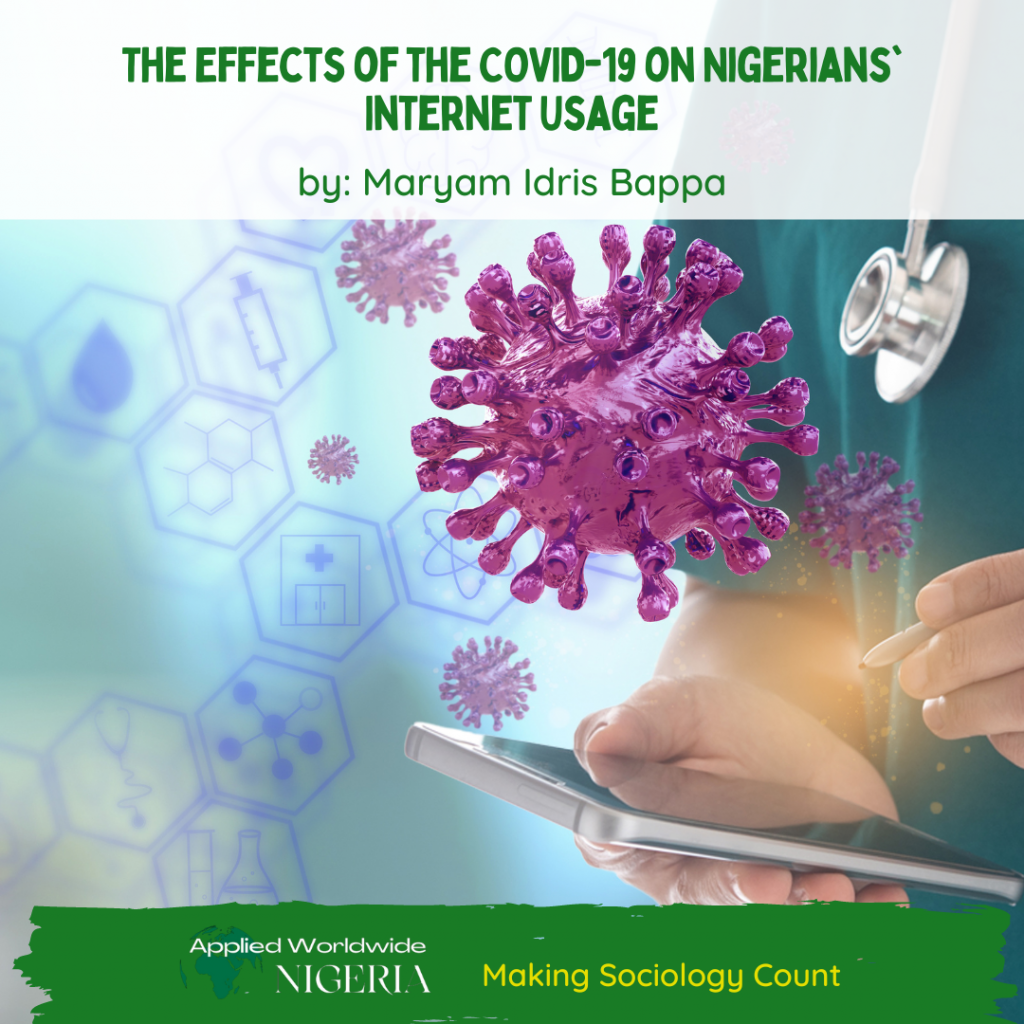It’s a common youthful memory among the majority of Nigerians aged 30 years and above to have at one point or another in their lives visited the internet cafe. Either to browse for school assignments or have access to Facebook and Myspace (the booming social media spaces of the mid to late 2000s). The number of Nigerians that had access to the internet in the 1990s was very meager. Come the 2000s and access to the internet was majorly reached via internet cafes. By the beginning of the 2010s, with the widespread use of BlackBerry phones, the fortunes of Nigerians in terms of access to the internet took a very positive turn as more people owned handheld phone sets with direct connection to internet services. And in this piece, we will look at the effects of the COVID-19 pandemic on Nigerians’ internet usage.

This positive trajectory of improvement in access to the internet by Nigerians continued steadily over the last decade with the emergence of android phones produced in China at a cheaper price making them affordable to the everyday Nigerian. Telecommunication companies such as MTN, Airtel, and Etisalat took to the drawing board by designing various data tariff plans that suit their customer base, especially the youth. Data was everywhere and the digital presence of Nigerians was felt from Twitter down to Amazon.
Then came the infamous Covid-19 pandemic which shook the world in a manner no one could have anticipated or ever imagined. Lockdowns were enforced as a last resort to tackle the much-dreaded virus that mutated faster than scientists could finish studying the previous variant. Social lives were reduced to the spaces that the internet provided and this ushered in a significant change in the way and manner Nigerians connected with the internet.
Effects of the COVID-19 Pandemic
Schools were closed and markets shut, hospitals were overwhelmed and the entire transport system of countries including aviation was wholly brought to a standstill. But life had to continue. Students had to be taught or lose out valuable time in their learning journey, commodities had to be sold despite the closure of markets, hospitals had to overcome the stress brought upon by the pandemic and people had to travel to places they needed to be without having to use the conventional transport medium. The internet provided a comfortable answer to all the questions posed by the pandemic.
The pandemic ushered in a truly digital system in pedagogy as educational institutions leveraged the internet to ensure learning continued. Private Universities in Nigeria ensured their students did not lose out on their academic sessions as virtual classes were held. Even the public universities with all their tussle with the federal government leveraged Zoom to hold classes. State Governments invested resources to create e-learning platforms for their students on YouTube, Facebook, and the like.
The closure of physical markets during the pandemic gave rise to the digital bazaar where business persons leveraged existing tools to market their wares. WhatsApp for business which was created in 2018 got its first real breakthrough during the lockdown with the platform currently boasting more than 50 million users. Zoom, an app created in 2013 did not get its real breakthrough until the pandemic hit with the app recording a whooping 45 billion minutes of virtual meetings over the course of the periods of lockdown.
The Data Usage After the Pandemic
According to data released by the NCC, the data consumption by Nigerians increased by 66.5% between 2019 to 2020 when the lockdown peaked. The country went from consuming 125,149.86 terabytes of data to 205,880.4 terabytes in 2020. This increase is corresponding with improvements in the country’s digital economy. As the digital economy contributed 21% of the country’s GDP during the first quarter of 2021.
As of 2022, the estimated number of Nigerians with access to the internet is at 108 million, which roughly equals to half of the country’s population. This is a significant growth from the 40 million internet users as at 2017. This number is poised to continue increasing as Nigeria has recently licensed some telecommunication companies to provide the latest and fastest internet connectivity, that is the 5G network.
The After Effects of the COVID-19 Pandemic
The change in Nigeria’s relations and dependence on the internet as a means to cope with the effects of coronavirus were not without some challenges. It was rumored, during the peak of the coronavirus that the virus was caused by the 5G network and all those living close to telecommunication service masts were more prone to developing symptoms of the virus. This was roundly debunked by doctors and professionals as it had no scientific backing. These rumors were mostly shared using the very internet connection that Nigerians came to depend on. The superstitious nature of Nigerians did not exhibit itself for the first time during the pandemic because back in 2014 when the Ebola virus broke out, Nigerians were brainwashed into believing salt is the cure to the Ebola virus. This rumor ushered in an unprecedented jamboree of salt rituals by unsuspecting Nigerians seeking to fortify themselves against the virus.
The pandemic led to much economic turmoil as many people lost their jobs or were placed on compulsory leave without pay. While some Nigerians were losing out on jobs, others were looking for opportunities that abound from the lockdowns. The lockdowns in a way, brought the business of POS to fame as banks were closed, and visiting the banks meant undergoing the
strict COVID-19 protocol. Therefore, many Nigerians fell back on the POS vendors as their saving angels. Now, there are POS businesses on virtually every major street in Nigeria’s major cities. Additionally, the cryptocurrency business boomed among Nigerians with the enforcement of lockdowns as many Nigerians engaged in the highly volatile investment. The cancellation of
major sporting events around the world meant fewer avenues for gambling, and cryptocurrency provided a good replacement for the thrill that is associated with gambling. Expectedly, Ponzi schemes thrived during the lockdown as it is said, an idle mind is the devil’s workshop. These Ponzi manifested in the form of fake COVID-19 relief loans sent out to unsuspecting Nigerians.
The lockdowns have left unforgettable memories in the minds and hearts of all people around the world who witnessed it and the disruptions they brought are not only limited to our internet usage. The lockdowns have informed a realization that remote work is possible and as such, some governments are already towing the lines of converting to a four-day working week. The Kaduna State Government has implemented this policy for 12 months now and the changes have enabled workers to spend more time with their families, rest, and recreate better all while not forgetting the focus of their primary assignment at work.
The lockdowns ushered in the popular phenomenon called the “corona wedding” for the first time in Nigerian culture, despite the reverence placed on organizing elaborate feats and banquets to celebrate weddings, Nigerians were compelled by circumstances to organize low-key weddings with minimal activities and fanfare. This wedding method is reported to be economical and serves as a dream come true for introverted couples. This is doubly beneficial for couples planning to cut down the cost of their wedding in these times of economic adversity.
Conclusion
If there are any lessons to learn from the aftermath of the pandemic, it’s that Nigerians are very resilient people and the Nigerian social system as a whole is one that is not easily shaken by adversities. Businesses are back and booming. Schools are thriving on the opportunities the pandemic presented it with while workplaces are being redesigned to entail only the most important of roles thereby increasing productivity. The country will hold its general election next month using technologies that were not used in the previous one and the prospect of a greater Nigeria seems to loom very largely on the horizon.







